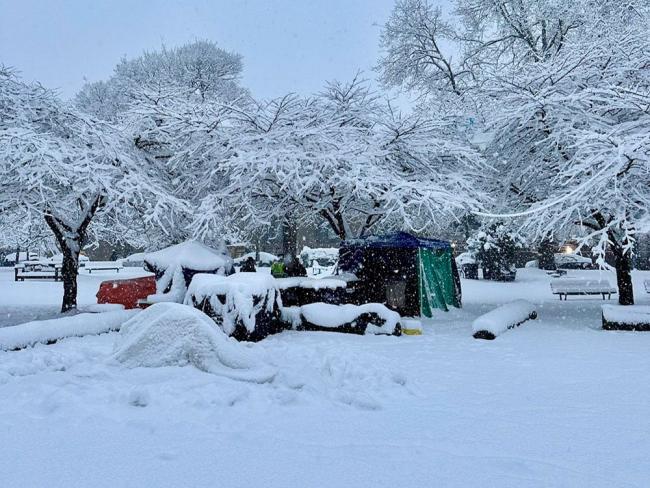Articles Menu

Jan. 19, 2024
Just as temperatures dropped below zero in Vancouver last week, city bylaw enforcement and police officers decamped dozens of people in Oppenheimer Park in the Downtown Eastside, confiscating and throwing away tents and sleeping bags, and offering little in the way of alternatives to a cold night on the street.
As medical students, we are deeply concerned by this counterproductive and harmful use of resources. Such “evictions to nowhere” are no solution to the growing problem of housing precarity in British Columbia. They multiply risks to the health of people experiencing homelessness, and place additional stress on already overstretched emergency departments. They must stop.
Decampments create health risks
During decampments, unsheltered people can have their prescribed medications taken or thrown away. According to a 2022 study of health-care providers serving people experiencing homelessness, among the medications that were frequently lost in so-called “street sweeps” were medical treatments for opioid use disorder, the overdose reversal agent naloxone and antiretroviral medications for HIV — all life-saving drugs.
An estimated 80 per cent of people experiencing homelessness have a chronic health issue. If people living with HIV, diabetes, heart failure and other conditions are unable to access their medications for long periods, the results can be deadly.
Cellphones and other devices necessary to use health services, including the Lifeguard overdose app, may be taken away in decampments.
People can also lose the sense of community and security that often forms in established encampments, putting them at greater risk of violence and accidental poisoning from the toxic drug supply.
In this way, decampments undermine evidence-based public health practices, such as the supervised consumption of substances and the distribution of naloxone kits.
The stress of daily harassment and the emotional toll of having personal belongings effectively stolen can also exacerbate substance use and mental health disorders.
Evicting people to emergency departments
Given that Indigenous Peoples have been and continue to be violently displaced from their traditional territories, these events may be particularly triggering for individuals from these communities. As a consequence of Canada’s colonial history and present, Indigenous folks are disproportionately represented among people experiencing homelessness throughout this province.
Homelessness is associated with ill health and an increased risk of death, and has outsized impacts on already marginalized groups.
Decampments can magnify these risks, leading to spikes in visits to emergency departments for acute worsening of existing health problems, injury and drug toxicity. A modelling study published last year found that decampments result in increases in overdoses and deaths due to life-threatening infections, and may increase hospitalizations among people experiencing homelessness by nearly 50 per cent.
When decampments are conducted without offering people any meaningful alternative to homelessness, city workers and local governments are not just evicting people to nowhere — they are evicting them to emergency departments, too.
As housing precarity in British Columbia reaches a fever pitch, municipalities across the province have been using such harmful approaches to deter people experiencing homelessness from sheltering in public spaces.
They are doing so at a time when health-care resources are already spread dangerously thin. Across B.C., emergency departments are struggling to provide timely care to patients coming in, primarily because of a lack of capacity in the services those patients will need once they have moved out — to the community, to hospital wards or to long-term care, for example.
The knock-on effects are grave: long wait times, staff burnout and worse health outcomes for people seeking care.
This broken system is the result of poor planning years, if not decades, ago; but it is the one that we, as the next generation of physicians, are inheriting.
While patient use of emergency rooms is not the cause of the current crisis in emergency departments, decampments are putting more pressure on overstretched resources by precipitating health emergencies that otherwise would not have happened.
In this way, they are placing entire communities — and their most marginalized members especially — at risk.
A call for compassion
B.C.’s struggling emergency departments cannot tolerate the cycles of displacement, harm and suffering created by decampments. As the future physicians who will soon be staffing them, neither can we.
That is why we echo calls from advocates for an immediate moratorium on winter decampments, noting the increased risks of hypothermia, frostbite, breathing problems and other deadly complications caused by cold conditions.
That is why we also urge municipalities to adopt more compassionate approaches to encampments, rooted in the principles of public health and harm reduction.
The considerable resources allocated to decampment operations could then be diverted to public health programming, sanitation infrastructure, fire safety and social support.
These municipalities can take inspiration from cities like Kelowna, where designated areas for day-and-night tenting have been established and are supplied with amenities like toilets and water points.
Although more safe, accessible shelter spaces are necessary, they are far from sufficient. Housing precarity is itself an emergency in B.C., and we need to see our elected leaders start treating it that way. We need B.C.’s leaders to prioritize the urgent creation of more affordable housing in municipalities across the province.
From a public health perspective, decampments are as reckless as they are ruthless. They must stop.
Sandra Smiley, Preet Gandhi and Kathryn Haegedorn are senior medical students in the University of British Columbia faculty of medicine, and members of the UBC Medical Undergraduate Society’s Political Advocacy Committee.
[Top photo: Oppenheimer Park in Vancouver’s Downtown Eastside on the morning of Jan. 17, after city bylaw enforcement and police officers decamped people from the park last week. Photo via Amanda Burrows on X.]